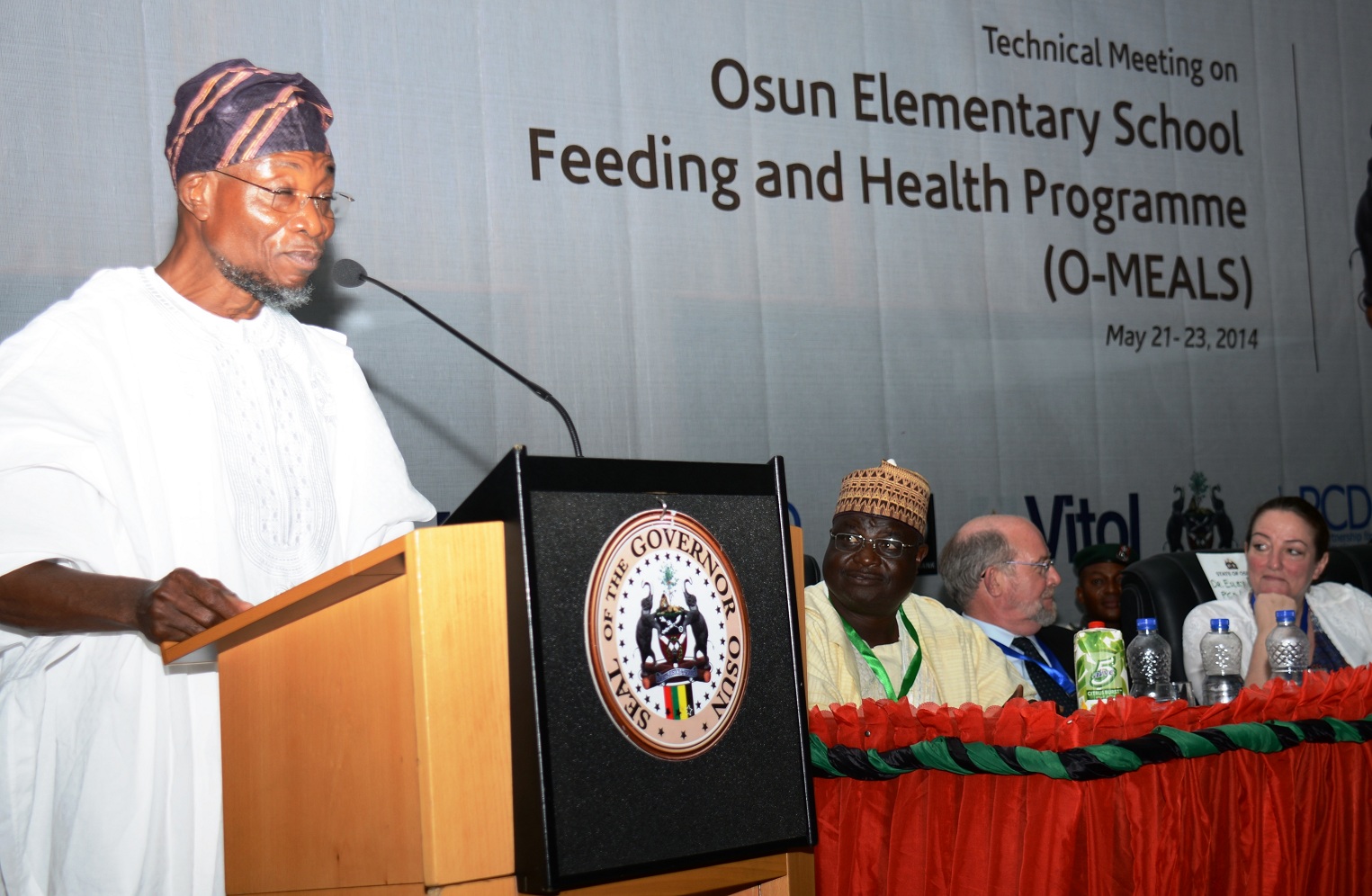
SPEECH: Osun Home-Grown School Feeding And Health Programme

ADDRESS DELIVERED BY THE GOVERNOR OF THE STATE OF OSUN, OGBENI RAUF AREGBESOLA. AT THE HIGH-LEVEL TECHNICAL MEETING ON HOME-GROWN SCHOOL FEEDING AND HEALTH PROGRAMME, HELD AT TRANSCORP HILTON HOTEL, ABUJA, ON MONDAY MAY 19, 2014
It is with genuine warmness of the heart that I stand here today to share our experience on the Osun Elementary School Feeding and Health Programme, which we christened O’MEALS.
The O’MEALS, I must say, has come a long way. The progress we have made and the achievements we have recorded in the State of Osun is on the one hand a clear testimony to what can be gained from multi-layered and multi-level coordination. It is, on the other hand, an affirmation of the benefit of political vision and passion.
The O’MEALS had its humble beginning in the inclusion byAfrican Governments of locally-sourced school feeding programmes in the Comprehensive Africa Agriculture Development Programme (CAADP) in 2003.
The same year also witnessed the launch of an initiative by theNew Partnership for Africa’s Development (NEPAD), along with the World Food Programme (WFP) and the Millennium Hunger Task Force. The initiative involved ‘a pilot Home Grown School Feeding and Health Programme (HGSFHP) designed to link school feeding to agricultural development through the purchase and use of locally and domestically produced food’.
Our country, Nigeria, happened to be one of the 12 pilot countries invited to implement the programme. As a result, the Federal Government came up with the Universal Basic Education (UBE) Act in 2004, which provided the enabling legislative backing for the execution of the Home Grown School Feeding and Health Programme (HGSFHP).
The Federal Ministry of Education selected 13 states of the federation, including the Federal Capital Territory (Abuja), to begin a phased-pilot implementation of the programme. Osun was fortunately among the selected states.
Thus the pilot primary school feeding programme in our state began as Osun State Home Grown School Feeding and Health Programme in May 2006. However, on our assumption of office in November 2010, we undertook a comprehensive review of the programme and re-launched it as O’MEALS on April 30, 2012. We immediately began its execution across all the 1,375 Elementary Schools in Osun.
The home grown feeding programme for school pupils has the advantage of being consistent with our own government’s goals – of banishing poverty, banishing hunger, creating work and wealth, creating functional education, restoring healthy living and engendering communal peace and progress.
Hence, we integrated it within the larger context of our overall development programme implementation. The objectives behind O’MEALS are: improvement of the nutrition and health of our school children; increase in school enrolment, retention and completion; and reduction of poverty and stimulation of small and medium scale enterprises development.
Towards these ends, experts were consulted to draw up suitable school-day menu while 3007 community caterers were employed to provide the meals on a daily basis. The days and menu are as follows:
- MONDAY (YAM with FISH STEW and ORANGE);
- TUESDAYS (RICE and BEANS with CHICKEN and ORANGE);
- WEDNESDAYS (BEANS PORRIDGE and BREAD with WHOLE EGG and BANANA);
- THURSDAYS (RICE with EGUSI-GARNISHED VEGETABLE SOUP with CHICKEN and BANANA);
- FRIDAYS (COCOYAM PORRIDGE with VEGETABLE SOUP and BEEF, with A SLICE OF PAWPAW).
The community caterers were organised into 124 functional Cooperative Investment and Credit Societies (CICS) in order to benefit fully from bulk procurement and allied services. Necessary operational funds are then transferred to the personal bank accounts of each caterer through their CICS.
The account from which this funding emanates is secure because it is not accessible through issuance of bank cheques. Funds can only be transferred from the account into the caterers’ and other contractors’ accounts by approved mandates.
The caterers receive funds in advance concerning meals to be prepared for school pupils within a two-week period (i.e. 10 school days). For organisational purpose, the number of pupils assigned to each caterer varies and so is the fund allocated.
The caterers each benefit from a government facilitated interest-free loan of N41,500 for the acquisition of their cooking and other kitchen utensils. The loan repayment period is spread over 36 months, with N1,152.78kobo deducted from their account every month. Already, our community caterers have each repaid a third of their loans.
I must also note that the community caterers are provided free-of-charge with a pair of uniforms (comprising gowns, caps and aprons) by the State Government of Osun at a cost of N11.6 million to the government.
The financial implication of feeding our Elementary school pupils is the expenditure of N12.7 million every school day, while the sum of N601,400 is paid out to the 3007 community caterers as transport fares on a daily basis. The financial expenditure for the O’MEALS is shared between the State Government and the constituting local government councils on a 40-60 per cent ratio respectively.
For effective implementation, the O’MEALS Programme is monitored at various levels. At one level, there are Planning Officers within the Local Government Education Authority office who are responsible for carrying out the implementation logistics. They act as liaison between the O’MEALS Office and the community caterers.
There are also the Local Inspectors of Education who also operate at the local government authority level. Then, there are the Independent Monitors who are drawn from the ranks of retired civil servants, Parent Teachers Association and community leaders. The O’MEALS Secretariat staff act as coordinators for the monitors.
In keeping with our Backward Integration policy, the O’MEALS has an input supply chain that is linked to our various agricultural development projects. Consequently, our OFOPS (Osun Fisheries Outgrowers Production Scheme) provide the catfish used for the school feeding programme.
The same applies to eggs, chickens, and cocoyam which also serves as material input for the feeding programme. Indeed, our administration initiated a ‘Cocoyam Rebirth Programme’, which is a major project under the direct supervision of the Osun Deputy Governor.
The Cocoyam Rebirth Programme scheme was designed with the aim of directly reaching the grassroots and practicing farming communities on how to improve and enhance cocoyam production, utilisation and marketing in the state. The ultimate objective is to revitalise cocoyam cultivation, with a view to using it on the O’MEALS menu.
In view of this, a training session was conducted for state and local government extension workers on cocoyam utilisation, production, marketing and post-harvest handling. The training programme, held on June 28, 2012, was attended by 234 extension workers.
A similar training programme was conducted for 2,000 farmers on August 8, 2012 across all the nine Federal Constituencies in the state. In the end, 332 Osun Youth Empowerment Scheme cadets, one from each of the electoral wards in the state, were selected as Cocoyam Off-takers for the rebirth programme.
The passion, prudence and seriousness we deployed to the implementation of the O’MEALS has earned us the worthy support and partnership of the London-based Partnership for Child Development (PCD).
Through this fruitful collaboration, we have received technical assistance in redesigning the school feeding programme through endorsement of the Transition Strategy Plan Document. The PCD also facilitated a Study Visit for four officers from O’MEALS Secretariat, along with a member of House of Assembly, to Accra in September 2013 to see the Ghana School Feeding Programme.
In the same vein, the PCD has facilitated technical assistance in collaboration with CHI Pharmaceuticals and Osun State Government on School Health and Nutrition (SHN) activities in public Elementary schools, especially regarding deworming of school pupils.
It is also, among other assistance programme, helping in the production of a programme document to better guide the implementation of the programme, as well as the appointment of a consultant to facilitate the development of Monitoring and Evaluation System for O’MEALS Programme.
The introduction and sustenance of the O’MEALS Programme has enabled us to achieve many of our development objectives. These include among others: Increased enrolment of pupils in our Elementary schools. To be sure, within the first five weeks of our introduction of the O’MEALS, elementary school enrolment shot up by 38,935 pupils.
Today, Osun has the highest Elementary school enrolment in Nigeria, second only to Niger State, according to the National Bureau of Statistics. This has had the implication of increasing our annual expenditure on O’MEALS to about N3 billion. And this does not include staff salary.
The programme has likewise improved the health status of our school pupils benefiting from the programme. It has drastically reduced the incidence of school absenteeism in comparison with the pre-O’MEALS period.
As a result of the O’MEALS, the production capacities of the farmer-suppliers of farm produce has been boosted, with corresponding increased prosperity for smallholder farmers.
The multiplier effects of the economic and material empowerment of different segment of society, consequent upon the implementation of O’MEALS, has had a redounding impact on the lives of our people and economy of Osun.
The O’MEALS is thus one programme that is worthy of every naira and kobo that had gone into it.
I thank you all for giving me your valuable time.



